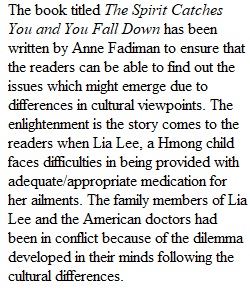


Q ECHD 317 Spring 2018 Reflective Essay on Fadiman Book Due Date: 5/13/18 – 250 points Read: • Fadiman, A. (1997). The spirit catches you and you fall down: A Hmong child, her American doctors, and the collision of two cultures. New York, NY: Farrar, Straus and Giroux. • Barrera, I., Kramer, L., & Macpherson, T. D. (2012). Skilled dialogue: Strategies for responding to cultural diversity in early childhood. Baltimore, MD: Brookes. (Sections 1 and 2) Write a 4-5 page (doubled-spaced) analytic essay that applies what you have learned about cultural competence from Skilled Dialogue to a dilemma from The Spirit Catches You and You Fall Down. There are three components to this essay. You should thoroughly and thoughtfully answer all questions within each component. Use specific examples from the Fadiman book; taking notes while you read will help you collect your thoughts for this assignment. Edit your writing, so that you present your ideas in an organized and clear manner. APA format is required for all citations. Refer to the grading rubric below – you can use it to evaluate and improve your essay before submitting it. The three components for this essay are listed below: 1. Describe and analyze one dilemma from the Fadiman book: What is the dilemma, what are the differing perspectives each party brings to this dilemma, and what are the factors that support each perspective? Be sure to discuss the dispositions, attitude, knowledge, or skills of each party involved. Include specific text references from the story in this section of your essay. 2. Apply your knowledge of culturally competent practice to this dilemma: If you feel the dilemma was handled appropriately by the professional(s) involved, what specific dispositions, attitude, knowledge, or skills do you feel contributed to the positive outcome? If you disagree with the handling of this dilemma, what specific dispositions, attitude, knowledge, or skills do you feel the professional(s) involved could have demonstrated to achieve a better outcome? Be sure to make specific references to Skilled Dialogue in this section of your essay. 3. What lesson(s) have you learned from the Lee case that you can apply to your practice in an early childhood setting? In what ways has the story changed your thinking about how best to work with families? Please give specific examples and avoid broad generalizations. Reflective Essay on Fadiman Book Grading Rubric Exceeds Expectations Meets Expectations Meets Some Expectations Does Not Meet Expectations Total Points Allowed 50 35 20 0 Quality of Analysis Part 1 Uses a wide range of relevant information. High level of critical analysis. Arguments and judgments are fully supported and well balanced. Uses a range of relevant information. Good level of critical analysis. Arguments and judgments are generally well supported and balanced. Uses mostly relevant information. Work lacks the required depth in analysis. Arguments and judgments are relevant but unsupported. Uses some relevant information. Displays minimal analytical skills. Arguments and judgments are not always relevant or may be absent. Quality of Analysis Part 2 Uses a wide range of relevant information. High level of critical analysis. Arguments and judgments are fully supported and well balanced. Uses a range of relevant information. Good level of critical analysis. Arguments and judgments are generally well supported and balanced. Uses mostly relevant information. Work lacks the required depth in analysis. Arguments and judgments are relevant but unsupported. Uses some relevant information. Displays minimal analytical skills. Arguments and judgments are not always relevant or may be absent. Quality of Analysis Part 3 Uses a wide range of relevant information. High level of critical analysis. Arguments and judgments are fully supported and well balanced. Uses a range of relevant information. Good level of critical analysis. Arguments and judgments are generally well supported and balanced. Uses mostly relevant information. Work lacks the required depth in analysis. Arguments and judgments are relevant but unsupported. Uses some relevant information. Displays minimal analytical skills. Arguments and judgments are not always relevant or may be absent. Organization Consistently well- organized, clear, and coherent; the ideas being expressed build on each other in a sophisticated manner Generally well- organized, clear, and coherent; the ideas being expressed build on each other. Beginnings of organization, lacks clarity and/or coherence. Ideas are generally disorganized, unclear and/or incoherent. Mechanics Accurate grammar, spelling, punctuation, APA conventions. Errors are very infrequent. Accurate grammar, spelling, punctuation, or APA conventions; errors rarely hinder communication. Generally accurate grammar, spelling, punctuation, or APA conventions; errors sometimes hinder communication Very frequent errors in grammar, spelling, punctuation. APA conventions not followed. No citations or references listed Total
View Related Questions